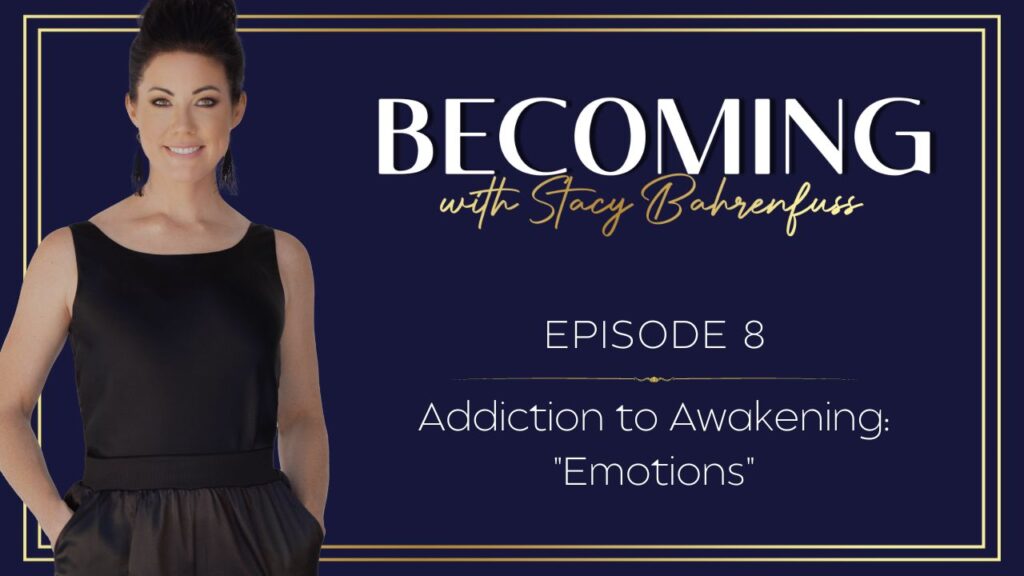
Emotions are fascinating.
They are the energy in motion that drives our experiences in the world.
Emotions are undeniably powerful but what sets them apart is their ability to weave a complex web that ensnares us unconsciously.
They not only hold sway over our thoughts and actions but also feed into the other addictions we grapple with.
In this intricate interplay, emotions become the driving force behind our patterns of victimhood, disorder, narratives, triggers, validation-seeking, self-sabotage, and more.
They are the threads that bind the cobweb of our addictions, making them seemingly insurmountable challenges.
However, understanding the ways in which emotions intertwine with our addictions is the key to unraveling this web and reclaiming our freedom.
We have been conditioned to believe that our emotions are reactions to external circumstances.
Today, I want to introduce a paradigm shift: our emotions are CHOICES.
By taking ownership of our emotions, we regain control over our lives.
Emotions + Victim Consciousness
Within the addiction to emotions, there is a significant aspect that keeps us trapped in the addiction cycle of victimhood too.
It is a common tendency to attribute our emotions solely to external factors, believing that our feelings are determined by the actions of others or the circumstances we find ourselves in.
This mindset perpetuates a sense of helplessness and powerlessness, reinforcing the belief that we are at the mercy of our surroundings.
To understand this further, let’s consider an example:
A scenario where someone makes a critical remark about our appearance:
In an emotions+ victim consciousness framework, we might immediately feel hurt, offended, or inadequate as a result of their words. We assign the power to affect our emotions entirely to the other person. We might say, “They made me feel ugly,” relinquishing control over our emotional well-being.
However, by reframing our perspective, we can consciously choose our emotional response. Instead of accepting their comment as a direct assault on our self-worth, we can recognize that we have the power to decide how we feel. We might choose self-acceptance and respond with compassion, understanding that their comment is a reflection of their own insecurities, rather than a reflection of our true value.
Emotions + Disorder
In the realm of emotions, they often play a significant role in perpetuating disorder and problems in our lives.
When we find ourselves consumed by our problems, our focus on them unintentionally stirs up a concoction of emotions that keep us trapped in a state of chaos. The more we dwell on our problems, the stronger these negative emotions become, reinforcing the disorder in our lives.
However, by becoming aware of the emotions that are triggered by our problems, we can begin to break free from this cycle.
Let’s explore this further:
A scenario of financial difficulties:
When facing financial challenges, it is common for a sense of anxiety, fear, and frustration to arise. These emotions can intensify as we continue to worry about our financial situation, leading to increased stress and a feeling of being overwhelmed by the disorder in our finances.
By becoming conscious of these emotions, we gain the power to choose a different emotional response. Rather than succumbing to negative emotions and perpetuating the chaos, we can consciously choose emotions such as resilience, optimism, and resourcefulness. By adopting a mindset of empowerment, we can shift our focus towards finding creative solutions, seeking financial advice, or exploring new opportunities to improve our situation.
Emotions + Stories
Our addiction to emotions is intricately connected to the stories we tell ourselves.
It is through these narratives that we allow our emotions to dictate our experiences, which can either disempower or empower us. By becoming aware of the emotional impact of different stories, we can consciously choose to craft narratives that uplift and empower us, leading to transformative and positive outcomes in our lives.
Let’s delve deeper into this connection between emotions and storytelling:
Emotions and Limiting Narratives:
Often, we find ourselves caught up in stories that reinforce negative emotions and beliefs about ourselves. For instance, if we constantly tell ourselves a story of unworthiness or failure, we generate emotions such as self-doubt, fear, or sadness. These emotions further solidify the narrative, keeping us trapped in a cycle of disempowerment.
On the flip side, we have the power to create narratives that uplift and inspire us. When we tell stories that align with our aspirations, values, and goals, we ignite positive emotions such as hope, determination, and joy. These emotions propel us forward and enable us to overcome obstacles, embrace challenges, and seize opportunities for personal growth. For example, instead of succumbing to self-pity during setbacks, we can reframe our experiences as valuable lessons and stepping stones toward success. By focusing on our resilience, progress, and the potential for future growth, we evoke emotions of optimism, perseverance, and gratitude, empowering us to navigate life’s ups and downs with grace and strength.
From Addiction to Awakening
Emotions have a profound impact on our lives and play a pivotal role in the various addictions we experience.
While emotions themselves are not inherently negative, it is our attachment and unconscious relationship to them that can lead to harmful behaviors and limitations.
We have explored how emotions intertwine with victim consciousness, disorder and problems, and the stories we tell ourselves. To learn more about how emotions also interplay with our addiction to triggers, patterns, validation, and self-sabotage, watch this YouTube Video:
Emotions Are Empowering
Emotions are like the invisible threads that weave a web, trapping us in addictive cycles and preventing us from reaching our full potential.
However, by bringing awareness to our emotions, understanding their influence on our thoughts and actions, and consciously choosing how we respond, we can break free from these patterns and embrace a life of empowerment, growth, and emotional freedom.